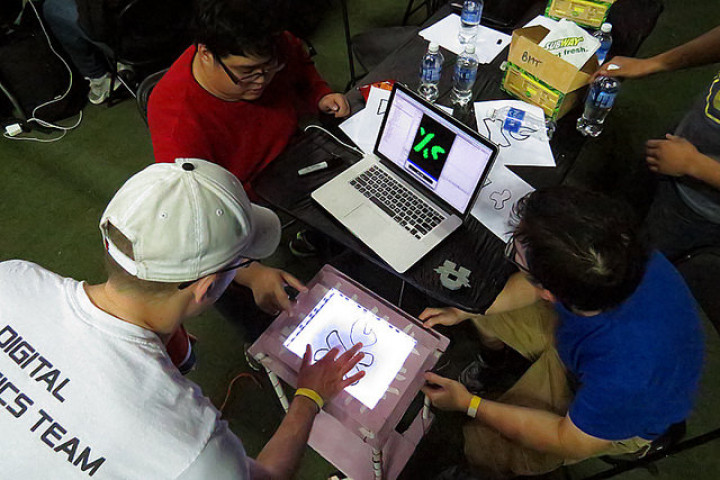CS Students Hack to Prizes, Success at Bitcamp
Bitcamp has grown. After attracting 750 students at its 2014 inauguration, Bitcamp's 2015 return was complemented by well over a thousand hackers from across the country and world as well as sponsorships from top industry names like Red Hat, Microsoft, and Twitter. A record 660 UMD students attended the hackathon, with hundreds of CS majors and graduates filling Cole Field House with demonstrations of their hacks for the weekend.
In step with its name Bitcamp 2015 continued the camping theme of the previous year, bringing back both the center-place “campfire” and the extremely popular late night s'mores station. The s'mores were in particular demand, with hundreds of hackers swirling about the grill on both nights of the event. Spirits were high throughout the entire 36 hours, aided by the “Color Wars” speed drawing competition, tech talks, and early-morning water pong and Super Smash Bros. tournaments providing (often more than brief) respite from long programming sessions. Organizers also arranged an entire “sleeping floor,” complete with 100 air mattresses for exhausted hackers to crash on, although many could be found slumped in their chairs or sleeping on Cole's padded floors.
Unlike many hackathons, Bitcamp does not offer a first prize for the “top” hack or idea, instead encouraging groups to tackle their own interests. Where other hackathons suffer from cognitive glut as teams attempt to hone their ideas to fit the award qualifications, Bitcamp encourages an open-ended approach both conducive to individual creativity and well suited to the [ubiquitous] camping imagery. The results of this policy are dramatic, with hackers working on everything from virtual reality (graciously aided by representatives from Oculus) to drone-based robotics, to web and mobile applications on a scope unmatched by more encumbered, prize-oriented hackathons.
However, that isn't to say that Bitcamp isn't rewarding. Apart from the fun and educational nature of the [event] itself, many of Bitcamp's sponsors offer their own prizes, given to projects at their discretion. CS students took home a fair share of these prizes, including the Bookholders “Best App/Program” prize of 3 Bitcoins for “EMFS,” which allows users to turn their normal email accounts into a filesyncing program. Another project by a team of CS [and engineering] students, “DangerZone,” won the “Best Pebble Hack” prize for their use of public crime data in tandem with the Pebble smart watch to “give [the user] the power to call the police at the press of a button.” Yet another, titled “happyData” by creators [...] took Booz Allen Hamilton's award for “Best DC Data Hack” for its novel use of virtual reality via Google Cardboard to “view results [public] data analysis in an exiting way.”
Bitcamp's explosive growth shows no signs of letting up. Although many of its original founders and organizers have already graduated or will this spring, Bitcamp has already become a mainstay of both the UMD Computer Science [and Engineering] community and the greater hackathon scene. Things will certainly be in flux with Cole Field House's impending demolition, but make no mistake: interest is only growing, and we can't wait to start hacking again.
The Department welcomes comments, suggestions and corrections. Send email to editor [-at-] cs [dot] umd [dot] edu.
